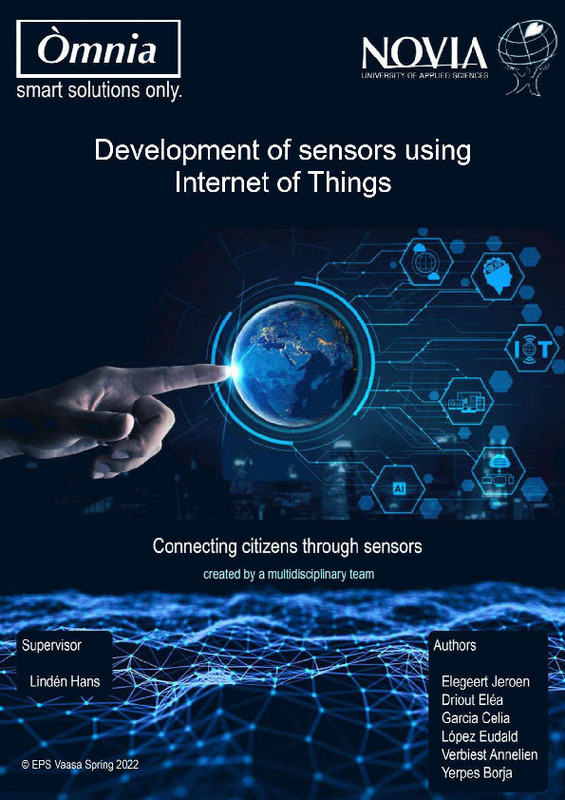JavaScript is disabled for your browser. Some features of this site may not work without it.
Buscar en RiuNet
Listar
Mi cuenta
Estadísticas
Ayuda RiuNet
Admin. UPV
Development of sensors using Internet of Things
Mostrar el registro sencillo del ítem
Ficheros en el ítem
| dc.contributor.advisor | Rodríguez Ballester, Francisco
|
es_ES |
| dc.contributor.advisor | Lindén, Hans
|
es_ES |
| dc.contributor.author | Yerpes López, Borja
|
es_ES |
| dc.contributor.author | López, Eudald
|
es_ES |
| dc.contributor.author | Elegeert, Jeroen
|
es_ES |
| dc.contributor.author | Verbiest, Annelien
|
es_ES |
| dc.contributor.author | Driout, Elèa
|
es_ES |
| dc.contributor.author | García, Celia
|
es_ES |
| dc.date.accessioned | 2022-09-26T09:35:47Z | |
| dc.date.available | 2022-09-26T09:35:47Z | |
| dc.date.created | 2022-06-07 | |
| dc.date.issued | 2022-09-26 | es_ES |
| dc.identifier.uri | http://hdl.handle.net/10251/186553 | |
| dc.description.abstract | [ES] En el presente Trabajo Final de Grado se realiza el desarrollo y diseño de diferentes sensores usando la tecnología IoT y se enmarca como parte del proyecto OboDigo4.0 en la Novia University of Applied Sciences en Vaasa, Finlandia. El proyecto será llevado a cabo por parte de un equipo multidisciplinar y multicultural dentro el proyecto Erasmus Project Semester. El objetivo del proyecto es obtener un dispositivo funcional para cada uno de los problemas propuestos y que sea capaz de comunicarse con el servidor de IoT de Novia. Durante el proyecto se desarrollarán 4 sensores con diferentes aplicaciones prácticas: medición de la profundidad de nieve; medición del nivel del agua del mar; medición de vibración, temperatura y humedad; y finalmente un contador de automóviles. Todos estos sensores deberán ser capaces de comunicarse con el servidor IoT de Novia. El proyecto estudiará las tecnologías más adecuadas para cada sensor, investigando las diferentes alternativas, así como las soluciones comerciales disponibles. A continuación se realizará la programación, comunicación y diseño de cada sensor, desarrollados mediante Arduino y Raspberry Pi . Finalmente se llevará a cabo la construcción de un dispositivo funcional para cada uno de ellos. Por último, concluiremos el trabajo analizando la consecución de los objetivos iniciales, evaluando la funcionalidad de cada sensor. | es_ES |
| dc.description.abstract | [EN] In this Final Degree Project, the development and design of different sensors using IoT technology is carried out as part of the OboDigo4.0 project at Novia University of Applied Sciences in Vaasa, Finland. The project will be carried out by a multidisciplinary and multicultural team within the Erasmus Project Semester. The aim of the project is to obtain a functional device for each of the proposed problems that is able to communicate with the Novia IoT server. During the project, 4 sensors with different practical applications will be developed: snow depth measurement; sea water level measurement; vibration, temperature and humidity measurement; and finally a car counter. All these sensors should be able to communicate with Novia¿s IoT server. The project will study the most suitable technologies for each sensor, investigating the different alternatives, as well as the commercial solutions available. Then the programming, communication and design of each sensor will be carried out, and developed using Arduino and Raspberry Pi. Finally, the construction of a functional device for each of them will be carried out. Finally, we will conclude the work by analyzing the achievement of the initial objectives and evaluating the functionality of each sensor. | es_ES |
| dc.format.extent | 178 | es_ES |
| dc.language | Inglés | es_ES |
| dc.publisher | Universitat Politècnica de València | es_ES |
| dc.rights | Reconocimiento (by) | es_ES |
| dc.subject | IoT | es_ES |
| dc.subject | Internet de las cosas | es_ES |
| dc.subject | Sensores | es_ES |
| dc.subject | EPS | es_ES |
| dc.subject | Erasmus Project Semester | es_ES |
| dc.subject | Industria 4.0 | es_ES |
| dc.subject | Internet of things | es_ES |
| dc.subject | Sensors | es_ES |
| dc.subject | Industry 4.0 | es_ES |
| dc.subject.classification | ARQUITECTURA Y TECNOLOGIA DE COMPUTADORES | es_ES |
| dc.subject.other | Grado en Ingeniería Electrónica Industrial y Automática-Grau en Enginyeria Electrònica Industrial i Automàtica | es_ES |
| dc.title | Development of sensors using Internet of Things | es_ES |
| dc.title.alternative | Desarrollo de sensores con Internet de las Cosas | es_ES |
| dc.title.alternative | Desenvolupament de sensors mitjançant Internet de les Coses | es_ES |
| dc.type | Proyecto/Trabajo fin de carrera/grado | es_ES |
| dc.rights.accessRights | Abierto | es_ES |
| dc.contributor.affiliation | Universitat Politècnica de València. Departamento de Informática de Sistemas y Computadores - Departament d'Informàtica de Sistemes i Computadors | es_ES |
| dc.contributor.affiliation | Universitat Politècnica de València. Escuela Técnica Superior de Ingeniería del Diseño - Escola Tècnica Superior d'Enginyeria del Disseny | es_ES |
| dc.description.bibliographicCitation | Yerpes López, B.; López, E.; Elegeert, J.; Verbiest, A.; Driout, E.; García, C. (2022). Development of sensors using Internet of Things. Universitat Politècnica de València. http://hdl.handle.net/10251/186553 | es_ES |
| dc.description.accrualMethod | TFGM | es_ES |
| dc.relation.pasarela | TFGM\151355 | es_ES |
Este ítem aparece en la(s) siguiente(s) colección(ones)
-
ETSID - Trabajos académicos [8906]
Escuela Técnica Superior de Ingeniería del Diseño






